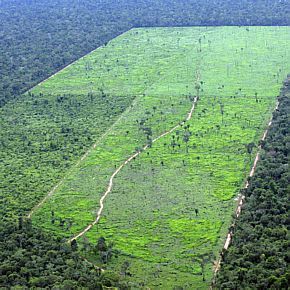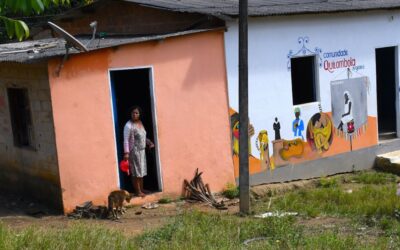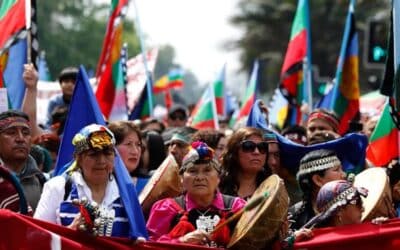NbS are taking a concerning foothold in UN policy discussions on climate change
By Souparna Lahiri and Valentina Figuera Martínez

The UN Environment Program (UNEP) working group on NbS is meeting from October 9-13, while the 25th meeting of the Subsidiary Body on Scientific, Technical and Technological Advice (SBSTTA) of the CBD convenes in Nairobi from October 15-19.
Policymakers in these multilateral forums are placing considerable time and resources on NbS, described as the sustainable management and use of natural features and processes to tackle socio-environmental issues. But in reality, these approaches, such as carbon offset schemes, are increasingly being exposed as human rights and ecological catastrophes and harmful distractions from the real imperative, which is to cut carbon emissions.
The driver behind these false solutions comes from an unsettling and powerful corporate lobby machine. The term ‘nature-based solutions’ is increasingly used by global polluters such as oil and gas companies, agro-businesses, high-emission transport sectors and governments of high-emissions nations. These are the very entities responsible for much of the environmental damage we witness today, impacting communities worldwide, particularly women in all their diversities. Some major conservation NGOs also support NbS, claiming it could optimise infrastructure and secure a biodiverse future.
However, the principles guiding NbS do not align with the wisdom, cosmology, traditional knowledge, and sustainable livelihoods of Indigenous Peoples, who have been the custodians of the planet’s forests, ecosystems and biodiversity for millennia. Recent investigations reveal that NbS initiatives have adverse effects on ecosystems, forests and biodiversity, as well as on Indigenous people and women in all their diversities and local communities, further marginalising those who have safeguarded nature for generations.
Take, for instance, Shell’s commitment to use NbS to offset its emissions by investing $100 million a year on nature-based projects. Similarly, French oil giant Total, in collaboration with Forêt Ressources Management – which describes itself as “a major player in the wood, forestry and agroforestry plantation sector in Africa” – has signed a partnership agreement with the Republic of the Congo to plant a 40,000-hectare forest on the Batéké Plateaux. The company eyes plantations on more than 10 million hectares of land reserves on the Congo’s Batéké Plateaux “to combat climate change.”
You may ask what’s wrong with planting trees and reforesting. As soon as you peel back the layers, you see that rather than solving the climate and biodiversity crises, these market-backed “nature-based solutions” to climate change are not “solutions” but greenwashing practices used by high-emissions industries in an increasingly failed attempt to mask their continued destruction of the planet.
A joint publication of the Food and Agricultural Organisation (FAO) and the Nature Conservancy shows how these actions reflect a trend where NbS in the agricultural sector primarily seeks financial returns through blended and private financing, bonds, green credit and equities, carbon credits, biodiversity and water offsets. Through this NbS lens, forests and land are viewed as assets to be monetised and an enhancement of natural capital.
The UN Environment Assembly (UNEA 5.2) in February 2022 in Nairobi passed resolution 5/5 on “Nature-based solutions for supporting sustainable development.” While this resolution provided momentum, in all its haste, for a ‘multilaterally agreed definition’ of NbS, it also recognised “the need for analysis of the effects of nature-based solutions . . . acknowledging that they do not replace the need for rapid, deep and sustained reductions in greenhouse gas emissions.” It also acknowledged concerns about the potential misuse of NbS and emphasised the need for harmony with ecosystem-based approaches.
This ambiguous and dubious link to the ecosystems approach is also reflected in the Kunming-Montreal Global Biodiversity Framework (KMGBF) under the targets related to climate change and biodiversity (T8) and restoring nature’s contributions to people (T11). The resolution also accepts a divergence of views on NbS and a lack of common understanding among Member countries.
The Indigenous Peoples’ Major Group has warned that carbon market offsetting instruments could infringe on the rights of Indigenous peoples and undermine their territories, with significant human rights implications. And they are right to do so. Proponents of NbS see and treat nature as an economic “asset”, detached from its custodians, aiming to reap future economic profits from their investments.
The danger lies when we see that the attempt to harmonise NbS with the ecosystems approach is extended to the KMGBF negotiations. The latter has a long history of evolution in the CBD and through various Climate COP (Conference of the Parties) decisions as a strategy to balance the three objectives of the Convention. While the ecosystems approach promotes conservation and sustainable use in an equitable way and recognises that humans, with their cultural diversity, are an integral component of ecosystems, the UNEA resolution is terribly mitigation-centric, trying to look for solutions that can manage the twin crises of climate change and biodiversity loss without recognising the role and involvement of Indigenous peoples, women in all their diversities and local communities. We should categorically reject this profoundly flawed and market-driven approach.
These attempts to equate and harmonise NbS with the ecosystems approach within UN multilateral fora are not only profoundly problematic but politically motivated and act as a barrier to addressing concerns on market-based partnerships seeking the commodification, financialisation and privatisation of the functions of nature and the peoples who live in harmony with it.
As we enter the UNEA intergovernmental consultations on NbS and the CBD SBSTTA 25 meeting on climate change and biodiversity, we have a golden opportunity to put people and communities at the centre of our agenda for climate change and biodiversity. It’s time to make necessary course corrections and pave the way for meaningful solutions to the twin crises of climate change and biodiversity loss.
Souparna Lahiri is a Senior Climate and Biodiversity Policy Advisor to the Global Forest Coalition (GFC). Valentina Figuera Martínez is GFC’s Gender Justice and Forests Campaign Coordinator.
A slightly modified version of this article was published by The Standard on October 10, 2023: https://www.standardmedia.co.ke/opinion/article/2001483112/global-polluters-offering-false-solutions-to-the-climate-crisis



